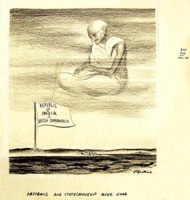Difference between revisions of "Statesmanship"
From Nordan Symposia
Jump to navigationJump to search (Created page with 'File:lighterstill.jpgright|frame *Date: [http://www.wikipedia.org/wiki/16th_Century 1592] ==Definitions== *1 : one versed in the principles or [[a...') |
m (Text replacement - "http://" to "https://") |
||
| Line 1: | Line 1: | ||
[[File:lighterstill.jpg]][[File:Statesmanship.jpg|right|frame]] | [[File:lighterstill.jpg]][[File:Statesmanship.jpg|right|frame]] | ||
| − | *Date: [ | + | *Date: [https://www.wikipedia.org/wiki/16th_Century 1592] |
==Definitions== | ==Definitions== | ||
*1 : one versed in the principles or [[art]] of [[government]]; especially : one actively [[engaged]] in conducting the [[business]] of a [[government]] or in shaping its [[policies]] | *1 : one versed in the principles or [[art]] of [[government]]; especially : one actively [[engaged]] in conducting the [[business]] of a [[government]] or in shaping its [[policies]] | ||
| Line 12: | Line 12: | ||
The [[words]] statesman or stateswoman are applied loosely to any head of [[state]], any senior [[political]] figure, or anyone who in a given [[moment]] exhibits a certain [[quality]] of ''statesmanship''. | The [[words]] statesman or stateswoman are applied loosely to any head of [[state]], any senior [[political]] figure, or anyone who in a given [[moment]] exhibits a certain [[quality]] of ''statesmanship''. | ||
==Quotations== | ==Quotations== | ||
| − | * [ | + | * [https://en.wikipedia.org/wiki/Aristotle Aristotle] – "What the statesman is most anxious to produce is a certain moral character in his fellow citizens, namely a disposition to virtue and the performance of virtuous actions." |
| − | * [ | + | * [https://en.wikipedia.org/wiki/Otto_von_Bismarck Otto von Bismarck] – "I consider even a victorious war as an evil, from which statesmanship must endeavor to spare nations." |
| − | * [ | + | * [https://en.wikipedia.org/wiki/James_Freeman_Clarke James Freeman Clarke] – "A politician thinks about the next elections — the statesman thinks about the next generations." |
| − | * [ | + | * [https://en.wikipedia.org/wiki/Mikhail_Gorbachev Mikhail Gorbachev] – "What is the difference between a statesman and a politician?... A statesman does what he believes is best for his country, a politician does what best gets him re-elected" |
[[Category: Political Science]] | [[Category: Political Science]] | ||
Latest revision as of 02:09, 13 December 2020
- Date: 1592
Definitions
- 1 : one versed in the principles or art of government; especially : one actively engaged in conducting the business of a government or in shaping its policies
- 2 : one who exercises political leadership wisely and without narrow partisanship
Description
A statesman is usually a politician or other notable public figure who has had a long and respected career in politics or government at the national and international level. As a term of respect, it is usually left to supporters or commentators to use the term. When politicians retire, they are often referred to as elder statesmen.
Statesmanship also conveys a quality of leadership that organically brings people together and of eldership, a spirit of caring for others and for the whole.
The words statesman or stateswoman are applied loosely to any head of state, any senior political figure, or anyone who in a given moment exhibits a certain quality of statesmanship.
Quotations
- Aristotle – "What the statesman is most anxious to produce is a certain moral character in his fellow citizens, namely a disposition to virtue and the performance of virtuous actions."
- Otto von Bismarck – "I consider even a victorious war as an evil, from which statesmanship must endeavor to spare nations."
- James Freeman Clarke – "A politician thinks about the next elections — the statesman thinks about the next generations."
- Mikhail Gorbachev – "What is the difference between a statesman and a politician?... A statesman does what he believes is best for his country, a politician does what best gets him re-elected"
